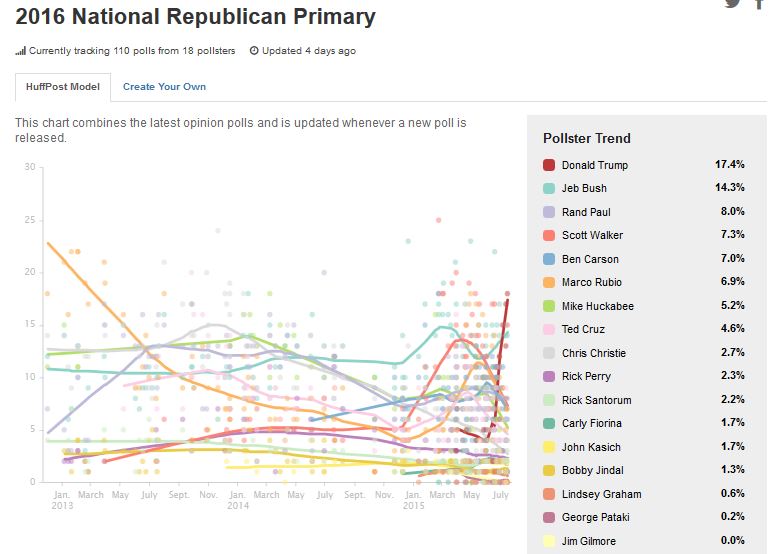Polls play a much larger role in coverage of politics than they deserve. It’s understandable in that there is a fresh one nearly every day, they are promoted by their media sponsors as a branding opportunity, and they entertain with the uncertain ups (Bachmann, Cain, Sanders, Trump, etc.) and certain falls of the candidates (Bachmann, Cain, Sanders, Trump, etc.). They have the veneer of mathematics, so they must be meaningful. Sometimes they have some importance, as with the revelations of low support for a Boston Olympics. So what uses do we make of polls?
Sadly as I write this the HuffPost Pollster has not been updated to account for Donald Trump’s latest insult to Senator John McCain, but let’s look at the graphic anyway:

Now what does this mean for projecting the 2016 Republican presidential nominee? It means absolutely nothing. Polls this far out in front of primaries have no reliability in predicting the eventual nominee. Since there have already been 110 polls recorded they must have some purpose and they do: they are published to market polling outfits and media outlets. Early media political polls should largely be labeled “For entertainment purposes only.”
And that leads us to the man dominating recent news cycles, the candidate atop HuffPost’s “Pollster Trend” – Donald Trump! Trump is surging toward the nomination!
That is entirely wrong. Trump’s chance of capturing the Republican nomination before his McCain statement was exactly zero, and it has deteriorated since. If you believe otherwise, I hope you cushioned your fall off the political turnip truck. Or, you are a media personality. I happened to wander by a television set Monday morning and Joe Scarborough was warning his co-hosts that if they thought the McCain remarks were the end of Trump, they are wrong. To be kind to Scarborough, Trump’s usefulness in filling air time might extend indefinitely. His candidacy, however, never had any chance. Political parties are not mass suicide pacts.
A far more intriguing use of polls shows up as The WBUR/MassInc poll drives much of the coverage of the effort of Boston2024 to bring the Olympics to Boston. The rise of opposition groups has been apparent but the encapsulation of the discontent in repeated polling is at least as important. Boston2024 has been driven to agree to Boston and statewide referenda on the Olympics and until the vote, the MassInc poll has been the most consistent and reliable indicator of public suspicion. Reports have it that unless poll numbers improve, the United States Olympics Committee could pull its award of the bid to Boston. The WBUR/MassInc poll has gotten wide coverage in the state and nationally – the Los Angeles Times is keeping close watch as LA could be an alternative if the USOC determines that the Boston numbers will not improve. MassInc’s Steve Koczela also provides sophisticated analyses inside the numbers – as in his commonwealthmagazine.org piece, Support for Boston2024 is not too low to win Olympic bid.
Sometimes questions are included in legitimate polls by advocates hoping to use the numbers to push their favored issues. In Experiencing Politics, former Massachusetts State Representative John McDonough recounts a question inserted in a poll that showed overwhelming public support for a cigarette tax to fund children’s health insurance – even Republicans favored it. Representative McDonough used that data in his fight to extend health insurance. As Deborah Stone explains in Policy Paradox: The Art of Political Decision Making, numbers are not mere expressions of precision in politics; they are tools of argumentation.
Then there are the “polls” that aren’t polls at all, such as websites or radio shows that ask you to contact them on some issue and then publicize the results. Or, the Mass Fiscal fraud poll, which purported to show support for Governor Baker’s reform proposals. If you believe in that poll, you may also believe that Donald Trump will capture the Republican nomination.

